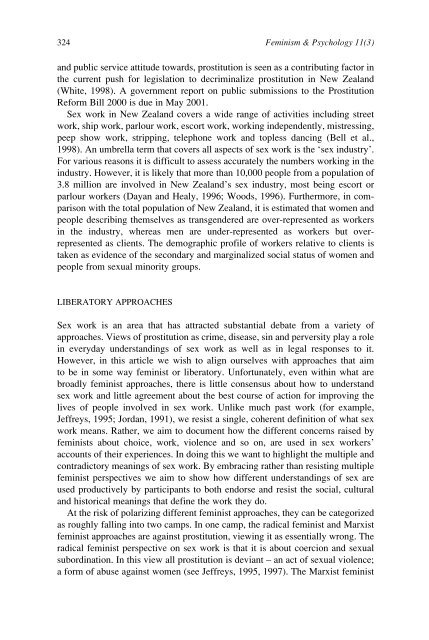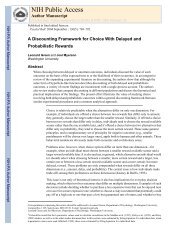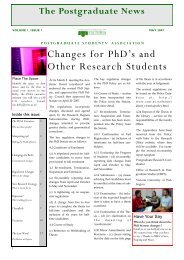A Feminist Discourse Analysis of Sex 'Work' - of /courses - Victoria ...
A Feminist Discourse Analysis of Sex 'Work' - of /courses - Victoria ...
A Feminist Discourse Analysis of Sex 'Work' - of /courses - Victoria ...
Create successful ePaper yourself
Turn your PDF publications into a flip-book with our unique Google optimized e-Paper software.
324 Feminism & Psychology 11(3)<br />
and public service attitude towards, prostitution is seen as a contributing factor in<br />
the current push for legislation to decriminalize prostitution in New Zealand<br />
(White, 1998). A government report on public submissions to the Prostitution<br />
Reform Bill 2000 is due in May 2001.<br />
<strong>Sex</strong> work in New Zealand covers a wide range <strong>of</strong> activities including street<br />
work, ship work, parlour work, escort work, working independently, mistressing,<br />
peep show work, stripping, telephone work and topless dancing (Bell et al.,<br />
1998). An umbrella term that covers all aspects <strong>of</strong> sex work is the ‘sex industry’.<br />
For various reasons it is difficult to assess accurately the numbers working in the<br />
industry. However, it is likely that more than 10,000 people from a population <strong>of</strong><br />
3.8 million are involved in New Zealand’s sex industry, most being escort or<br />
parlour workers (Dayan and Healy, 1996; Woods, 1996). Furthermore, in comparison<br />
with the total population <strong>of</strong> New Zealand, it is estimated that women and<br />
people describing themselves as transgendered are over-represented as workers<br />
in the industry, whereas men are under-represented as workers but overrepresented<br />
as clients. The demographic pr<strong>of</strong>ile <strong>of</strong> workers relative to clients is<br />
taken as evidence <strong>of</strong> the secondary and marginalized social status <strong>of</strong> women and<br />
people from sexual minority groups.<br />
LIBERATORY APPROACHES<br />
<strong>Sex</strong> work is an area that has attracted substantial debate from a variety <strong>of</strong><br />
approaches. Views <strong>of</strong> prostitution as crime, disease, sin and perversity play a role<br />
in everyday understandings <strong>of</strong> sex work as well as in legal responses to it.<br />
However, in this article we wish to align ourselves with approaches that aim<br />
to be in some way feminist or liberatory. Unfortunately, even within what are<br />
broadly feminist approaches, there is little consensus about how to understand<br />
sex work and little agreement about the best course <strong>of</strong> action for improving the<br />
lives <strong>of</strong> people involved in sex work. Unlike much past work (for example,<br />
Jeffreys, 1995; Jordan, 1991), we resist a single, coherent definition <strong>of</strong> what sex<br />
work means. Rather, we aim to document how the different concerns raised by<br />
feminists about choice, work, violence and so on, are used in sex workers’<br />
accounts <strong>of</strong> their experiences. In doing this we want to highlight the multiple and<br />
contradictory meanings <strong>of</strong> sex work. By embracing rather than resisting multiple<br />
feminist perspectives we aim to show how different understandings <strong>of</strong> sex are<br />
used productively by participants to both endorse and resist the social, cultural<br />
and historical meanings that define the work they do.<br />
At the risk <strong>of</strong> polarizing different feminist approaches, they can be categorized<br />
as roughly falling into two camps. In one camp, the radical feminist and Marxist<br />
feminist approaches are against prostitution, viewing it as essentially wrong. The<br />
radical feminist perspective on sex work is that it is about coercion and sexual<br />
subordination. In this view all prostitution is deviant – an act <strong>of</strong> sexual violence;<br />
a form <strong>of</strong> abuse against women (see Jeffreys, 1995, 1997). The Marxist feminist






